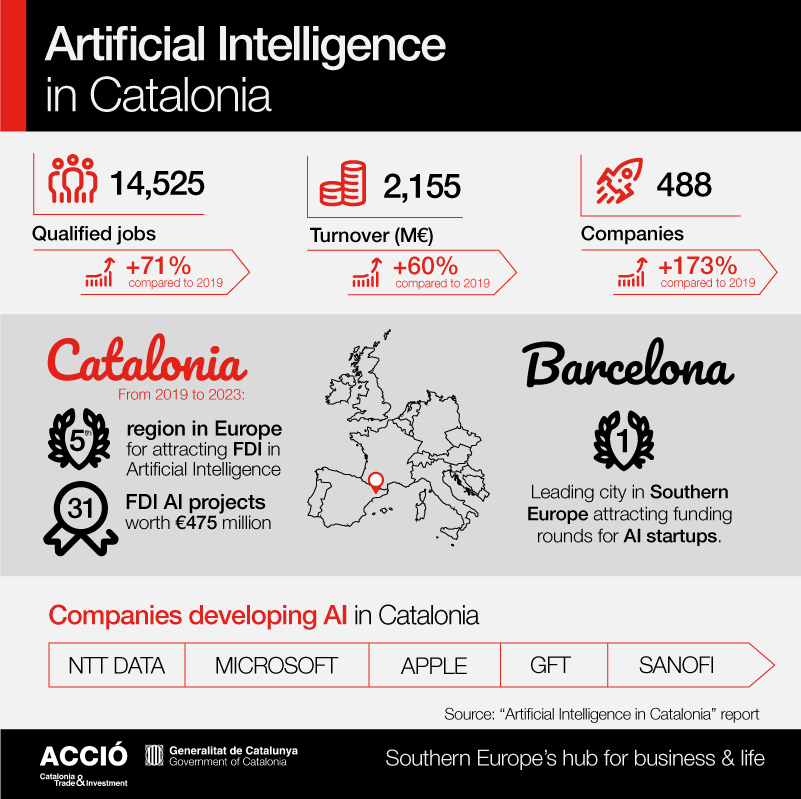“Barcelona is a great hub of innovation and talent attraction”
Jordi Ribas, Corporate Vice President of Microsoft
Artificial intelligence already generates a turnover of 2,155 million euros, the highest among the exponential new technologies in Catalonia. Also, nearly 500 companies in Catalonia are dedicated to this technology, generating 14,525 jobs.

Catalonia already has 488 companies dedicated to artificial intelligence (AI), almost three times more than in 2019. This is one of the main conclusions of the study "Artificial Intelligence in Catalonia," carried out by ACCIÓ-Catalonia Trade & Investment, the Business Competitiveness Agency of the Ministry of Business and Labour, in collaboration with CIDAI- Centre of Innovation for Data Tech and Artificial Intelligence and within the framework of the Catalonia.AI strategy. You can search our database to find Catalan suppliers in the AI sector.
Artificial intelligence already generates a turnover of 2,155 million euros (60% more than in 2019), the highest among the exponential new technologies in Catalonia, which represents 0.8% of the country. Nearly 500 Catalan companies are dedicated to this technology, and they currently generate 14,525 jobs, 71% more.
In Catalonia, this ecosystem has experienced significant growth since the previous version of the study in 2019, focusing on areas such as machine learning (used by 58% of companies) or AI platforms (32% of cases).
In terms of application sectors, the services sector, which includes leisure, retail, and marketing activities, is the area where this technology is most used (45% of cases). In the second place, 41% of companies are developing solutions for the industry. In third place are solutions for the health sector.
Companies working with artificial intelligence also offer applications for other sectors, such as finance, mobility, resource management, and culture.
Regarding the details of the artificial intelligence ecosystem in Catalonia, 44% of the companies that make up the ecosystem are startups with a high capacity to attract investment. In fact, Barcelona is the leading city in attracting funding rounds for artificial intelligence startups in Southern Europe, with an average of 2.1 million euros raised every 18 days.
It is also a business ecosystem with an outstanding capacity to generate business. In this sense, 39% of the companies have a turnover of more than one million euros, and 17% generate more than 10 million euros annually.
“Barcelona is a great hub of innovation and talent attraction”
Jordi Ribas, Corporate Vice President of Microsoft


488 companies

€2,155M in turnover

14,525 employees
The artificial intelligence ecosystem in Catalonia is made up of a variety of elements that make it one of the most attractive in the European panorama. Catalonia is the fifth region on the continent and the first in Southern Europe in terms of attracting foreign direct investment in this technology between 2019 and 2023. Specifically, 31 projects worth 475 million euros have been attracted, generating more than 3,000 jobs.
During this period, leading multinationals developing artificial intelligence, such as NTT Data, Microsoft, Apple, GFT, and Sanofi, have invested in Catalonia to set up some of their projects. In fact, of the 160 international technology centers created in Catalonia, 87% are focused on artificial intelligence.
This attractiveness of Catalonia is favored by an environment in which benchmark initiatives such as the Catalonia.AI strategy, promoted by the government through the Secretary of Digital Policies, stand out. The strategy includes, among others, the Observatory of AI Ethics of Catalonia (OEIAC), the AI Research Alliance (AIRA), the community of entities that develop or integrate AI solutions within the Digital Catalonia Alliance (DCA-IA), and the Center of Innovation for Data Tech and Artificial Intelligence (CIDAI), which manages technology transfer.
Catalonia.AI also promotes, in collaboration with the Barcelona Supercomputing Center (BSC), the AINA project, which generates and provides open models and datasets for the development of AI in Catalan.
In addition, the Catalan AI ecosystem has also been strengthened by attracting European funding for projects such as the Digital Innovation Hub DIH4CAT, a connected network of assets, infrastructures, and knowledge in Catalonia aimed at testing and experimenting with advanced digital technologies to accelerate the digital transformation of Catalan industry. The Artificial Intelligence Hubs Network of the RETECH program also aims to create a Europe-wide reference network in artificial intelligence to improve technological capabilities by developing driving projects.
Catalonia also has a wide network of up to 29 technology and research centers working in the field of artificial intelligence, with world-class centers such as the Research Institute of Artificial Intelligence (IIIA-CSIC) or the Research Center of Intelligent Data Science and Artificial Intelligence (IDEAI) of the Universitat Politècnica de Catalunya (UPC).
The study also analyzes the global context of artificial intelligence, with an annual growth rate of 35.5% and an expected global market value of $1.85 billion by 2030. The United States, China, and Japan are the three main operating markets for this technology. However, the European Union has enacted the first specific law regulating artificial intelligence.
According to the report, 75% of companies worldwide plan to adopt artificial intelligence in the next four years, demonstrating the technology's current and future relevance. In fact, the demand for specialists in this field is expected to grow by 40% over the next four years.
The rise of artificial intelligence is accompanied by numerous opportunities offered by this technology, such as improved productivity, the generation of new skills, or potential calculations. According to the report, it will be important for both the private and public sectors, potentially generating technological cooperation with developing regions.
With these opportunities, however, come the challenges posed by the increasing use of this technology. These challenges include the increase in consumption of resources such as energy or water, the changes it can bring to the structure of the workforce, or the increase in cybersecurity risks. Finally, as the study points out, the challenge posed by its use as a new geopolitical weapon in a fragmented global context and by the generation of fake news.

Get our free report on Artificial Intelligence in Catalonia and its applications in the industry.
21 Jul 2024
Tarek Besold, Sony AI: “We came to Barcelona because it is a city of creativity and inspiration”
15 May 2022
Midokura, a leading AI company that chose Barcelona to establish a development center
15 Feb 2023
ISE Open Innovation Challenge: the place to find cutting-edge technology
23 Feb 2022
Cristian Pascual, Barcelona Health Hub: “Barcelona has all the ingredients to become one of the world’s digital health capitals”